Politics
British FM set for inaugural diplomatic visit to Türkiye
In his first official bilateral visit to Türkiye, British Foreign Secretary David Lammy will be in Ankara on Monday. Lammy is scheduled to meet his Turkish counterpart Hakan Fidan, Foreign Ministry sources said on Sunday.
During the meeting, Fidan is expected to stress Türkiye’s commitment to its NATO ally and strategic partner, expressing satisfaction with the positive trajectory of bilateral relations and highlighting the aim to further strengthen cooperation across all fields.
The importance of continued close cooperation between relevant authorities in security and counterterrorism will be underlined, along with the recognition of economic, trade, financial, defense industry and tourism ties as driving forces in relations between the two countries.
The meeting is expected to stress the significance of negotiations aimed at updating the countries’ free trade agreement to accelerate economic ties and boost the trade volume between Türkiye and the U.K.
It is expected that Türkiye and Britain, two allies outside the European Union, will be emphasized as integral elements of Europe’s defense and security architecture, and that the need to strengthen cooperation between the two countries in the defense industry in light of the changing global security environment will be underlined.
The contributions to bilateral relations of nearly half a million Turkish-origin citizens living in the U.K. will be acknowledged in the meeting, and it is expected to be emphasized that close dialogue and coordinated cooperation between the two countries on regional and global issues remain important.
The talks will also address how a lasting solution to the Palestinian issue, which lies at the heart of many problems in the Middle East, is crucial for peace and stability in the region, also welcoming the recent cease-fire between Iran and Israel, and how negotiations should resume to resolve disagreements over nuclear energy.
The meeting will highlight the vital importance of ending the Russia-Ukraine war through diplomacy to achieve a just and sustainable peace and that following the lifting of sanctions on Syria, cooperation will be encouraged to help restore the country’s economic, infrastructure, and humanitarian capacities.
Türkiye and the U.K. are allies and established a “strategic partnership” in 2007.
Last year, Türkiye announced that it had agreed with the United Kingdom to initiate negotiations in Ankara to revise their free trade agreement (FTA), as the sides are looking for ways to strengthen economic ties. The agreement has been in place since the U.K.’s departure from the European Union in 2020. Lammy’s visit precedes technical talks to upgrade the FTA, which will take place soon, according to media reports.
Politics
Türkiye key to stability in Middle East: US envoy
U.S. Ambassador to Türkiye and Special Envoy for Syria Thomas J. Barrack said he considers Türkiye the key actor in the Middle East for stability amid ongoing conflicts.
Speaking to Anadolu Agency (AA) on Sunday as he visited western city of Izmir, Barrack called for “new dialogue” in the region. Barrack’s remarks come amid a brief but tense conflict between Israel and Iran after Israel’s attacks on Iran earlier this month and ongoing genocidal aggression of the Netanyahu administration targeting Palestinians.
“Israel needs to be redefined. It’s currently going through that process,” Barrack said. “What is happening between Israel and Iran is a signal for all of us that the time is up, it’s time to carve a new path. And the key to that path is Türkiye.”
Barrack underlined the personal relationship between U.S. President Donald Trump and President Recep Tayyip Erdoğan, adding that U.S. Secretary of State Marco Rubio and Foreign Minister Hakan Fidan share a similar rapport.
“At a critically important time in history, these four individuals have built a relationship based on trust, mutual understanding and closeness,” Barrack said. “There’s an enormous opportunity because we have two leaders who trust each other, supported by ministers who know exactly how to execute this vision.”
He pointed to the two phone calls between Trump and Erdoğan as pivotal in building this trust.
Barrack stressed that the U.S. has always viewed Türkiye as a vital NATO ally, but argued that the country hasn’t always been given the recognition it deserves as a major regional actor.
“The chaos in the Middle East has been perpetuated, in large part, by constant Western interventions,” he said. “But Trump and Erdoğan see this as an opportunity to shift the dialogue and that takes bold leadership.”
“I believe Türkiye is at the center of all this, as we’ve seen in Syria,” he added, noting Türkiye’s crucial role in regional developments.
Asked whether there is progress in reversing the U.S. sanctions under the Countering America’s Adversaries Through Sanctions Act (CAATSA) and restoring Türkiye’s participation in the F-35 fighter jet program, Barrack responded, “Absolutely yes.”
He emphasized that Türkiye remains a crucial partner for NATO, recalling that many parts of the F-35 are manufactured in Türkiye. He said both Trump and Erdoğan, along with Rubio and Fidan, are aligned on finding a solution.
“I believe by the end of this year, there’s a real chance for a resolution,” Barrack said, suggesting that Congress is prepared to look at the issue with fresh eyes.
“For the first time, the U.S. and Türkiye are not just defense partners but have a shared commitment to move from defense to breakthroughs, in diplomacy, security and cooperation,” he said.
Responding to a question about whether the current situation in Gaza affects expectations around expanding the Abraham Accords, Barrack said, “Despite the challenges, there’s no reason Israel cannot be integrated with the Muslim world.”
He noted that the process started with Trump’s first overseas visit to Riyadh in 2017, eventually leading to the Abraham Accords between Israel, the United Arab Emirates (UAE), Bahrain and Sudan. But he acknowledged that expanding those agreements while the Gaza conflict persists is a significant challenge.
“I still believe we’ll see a cease-fire in Gaza in the near future,” Barrack said. “Once that happens, we can begin moving toward non-conflict agreements between Israel and others, step by step.”
Barrack suggested that backchannel dialogues could begin between Israel and Syria, as well as Israel and Lebanon, focused initially on border security and broader conflict de-escalation.
“Syria’s new President Ahmed al-Sharaa does not harbor religious hatred toward Israel and has made clear his desire for border peace,” Barrack said.
“Israel wants the same. We’ll probably see initial discussions on simple issues like border security, which could grow into a broader peace dialogue,” he added.
He expressed hope that a similar framework could be applied to Lebanon.
“Why can’t we live in peace?” Barrack asked. “Regardless of anyone’s religious beliefs, that should be separate from politics.”
Addressing the U.S. approach to northeastern Syria, Barrack emphasized that the U.S. recognizes only one legitimate counterpart in Syria: the Syrian government.
“The entity known as the SDF, which includes elements like the PKK/YPG, cooperated with U.S. forces in the fight against (Daesh),” he said, referring to the Syrian wing of the terrorist group that has killed thousands in Türkiye since 1980s. “But the SDF must now be integrated, both militarily and politically, into the new Syria, just like the Alawites, Druze, and others seek representation.” This transformation, Barrack acknowledged, will take time.
Barrack praised Türkiye’s defense industry, specifically citing the success of Turkish drones like the Bayraktar TB2, and commended Turkish Airlines as one of the world’s best carriers.
“Türkiye has the second-largest army in NATO. It possesses air defense, hard power, and all the key elements of security — but more importantly, it has an extraordinary, hardworking population that understands the world,” Barrack said. “This is something President Trump recognizes.
He concluded, “The key to solving the regional crisis runs through Türkiye.”
Politics
Türkiye’s CHP seeks Germany’s aid as it faces moment of truth
Two days before a trial that may end his reign at the Republican People’s Party (CHP), Turkish main opposition leader Özgür Özel was in Germany, calling for support. Speaking at the Social Democratic Party (SPD) conference in Berlin, Özel sought to rally like-minded German counterparts for his party tainted with allegations of corruption, going all the way up to his office. In response, the SPD passed a motion calling for the release of CHP’s Istanbul mayor, Ekrem Imamoğlu, but they had no words for Özel himself.
On Monday, a court in Ankara will decide upon the legitimacy of an intraparty election held in November 2023 that brought Özel to power in Türkiye’s oldest party. Özel’s supporters in the party, including Imamoğlu who was arrested in March on separate graft charges related to his alleged wrongdoings at Istanbul Metropolitan Municipality, are accused of buying votes for Özel during the 2023 election in which he ran against Kemal Kılıçdaroğlu. If the court rules for cancelation of the election, the CHP will have a chance to appeal the verdict, a process that may take months and prolong Özel’s tenure. If the court rules for “absolute nullification,” the election will be deemed invalid and the party’s top seat will either be handed to Özel’s predecessor Kılıçdaroğlu or a trustee will be appointed before a new election. Kılıçdaroğlu, at the cost of alienating himself with his party now dominated by pro-Özel circles, expressed that he was open to take the reins again, instead of “seeing the party run by a trustee.”
In Germany, Özel renewed his party’s pledge to achieve full EU membership if they came to power and urged Europe to prioritize “democracy” instead of economic or security policy interests. Although the EU has sometimes had shaky relations with Türkiye under the leadership of President Recep Tayyip Erdoğan, it still prizes cooperation with the government, especially in terms of security under the shadow of the Russia-Ukraine conflict. Türkiye plays a critical role as a country enjoying good ties with both sides of the conflict, as well as the main actor in the southeastern flank of NATO where it commands the second-largest army of the alliance. In addition, the EU recently courted Ankara for partnership in the defense industry, something even foes of Türkiye acknowledge as spectacularly enhanced with locally made uncrewed aerial vehicles and fighter jets.
Even if the CHP wins the court battle against allegations of vote buying, Imamoğlu, who was declared a future presidential candidate of the party after his arrest, will have a hard time to vindicate him as more people come forward to confess the wrongdoings of the alleged criminal network set up by the former mayor to enrich himself and other CHP members.
Addressing an event in Istanbul on Saturday, President Erdoğan slammed how the opposition looted resources of Istanbul. “Their own bureaucrats, people they did business with openly confess their wrongdoings. It is now clear how resources that should be spent for the public are spent for designing the political ambitions,” he said, referring to offers of cash, jobs and privileges allegedly made to CHP delegates in exchange of voting for Özel in the 2023 intraparty election.
“More tentacles of the octopus are being uncovered,” Erdoğan added, referring to his earlier analogy about party’s network of corruption.
“Nowadays, all they can think about is the shady election and the possible absolute nullification of the election,” he said.
“It is sad to see the chair of a party that boasts being part of the National Forces (which fought invaders during post-World War One battle of independence) beg for democracy from foreign politicians. He kowtows to them so that they would exert pressure on us. They did nothing good for this country and their toxic politics is harming Türkiye and its economy,” he said.
Politics
Libya, Türkiye defend deal as Greece sustains objection
Greece is pushing again against a 2019 maritime deal between Türkiye and Libya. After Ankara, Libya’s eastern Benghazi-based government on Saturday rejected recent remarks from Greek officials about the legitimacy of the deal.
Libyan Prime Minister Osama Hammad stated that the deal between the two countries is internationally legitimate. He reaffirmed Libya’s firm rejection of any challenges or interference with its sovereign decisions, particularly regarding international agreements made with allies.
The Libya-Türkiye cooperation is carried out under international legitimacy and does not violate the sovereignty of any country, Hammad noted.
He emphasized that Libya reserves the right to respond firmly to any actions that jeopardize its territorial integrity or political sovereignty, and he warned Greece about the consequences of continuing its policy of provocation and escalation. Hammad also emphasized that Libya’s maritime rights are nonnegotiable and can only be discussed within international legal frameworks, noting that his government has taken decisive steps in response to Greece’s recent attitudes.
Greek Prime Minister Kyriakos Mitsotakis’ statements targeting the deal have provoked serious reactions from authorities in eastern and western Libya.
The Libyan National Unity Government had expressed deep concern in a June 19 statement regarding the announcement by Greece in the Official Journal of the EU on June 12 for tenders for hydrocarbon exploration and exploitation in the areas disputed with Libya, south of the island of Crete.
The Libyan National Unity Government statement, which emphasized the importance of respecting international law, said the steps are a clear violation of Libya’s sovereign rights, expressing clear objection to any exploration or drilling activity in those areas without a prior legal framework that respects the rules of international law.
It urged Greece to adopt constructive dialogue and negotiations based on international legal principles that consider the interests of all parties to reach fair and equitable solutions.
Türkiye on Friday said the conclusions adopted at the European Union leaders’ summit demonstrate that Greece and the Greek Cypriot administration continue efforts to impose their “maximalist claims,” which Ankara says violate international law and the principle of equity. “The results adopted at the European Union (EU) Leaders’ Summit held on June 26, 2025, demonstrate that Greece and the Greek Cypriot Administration of Southern Cyprus (GCASC) continue their efforts to impose their maximalist claims, which are contrary to international law and the principle of equity, on the EU,” Foreign Ministry spokesperson Öncü Keçeli wrote on X.
Keçeli reiterated Türkiye’s position that the 2019 Memorandum of Understanding signed with Libya on the delimitation of maritime jurisdictions in the Eastern Mediterranean is “entirely legitimate under international law.” He said the agreement clearly shows that Ankara will not allow violations of its lawful rights and interests in the region. He criticized the EU for issuing “politically motivated and biased” statements on a sensitive matter such as maritime delimitation, which he emphasized involves legal and technical complexities. “Instead of endorsing legally invalid claims, the EU should call on all its members to comply with international law,” Keçeli said. He added that Türkiye will continue to firmly defend its legitimate rights and interests in the Eastern Mediterranean within the framework of international law.
The 2019 maritime boundary agreement that includes provisions for Turkish hydrocarbon exploration within Libya’s territorial waters is still not fully implemented. In 2022, the two countries signed a hydrocarbons memorandum of understanding, paving the way for Turkish companies to conduct seismic surveys and drilling operations. The agreement took a new turn on June 25 when Turkish Petroleum (TPAO) signed a memorandum of understanding with Libya’s National Oil Corporation (NOC) for a 2D seismic survey in the Libyan waters. Under the memorandum, TPAO will conduct surveys in four offshore blocks off the Libyan coast, over an area covering 10,000 kilometers (6,213.71 miles). The data collected during the surveys will be processed within nine months.
After a long period of tensions marked by disputes over irregular migration, the Cyprus dispute, energy exploration and territorial sovereignty in the Aegean, Ankara and Athens have been taking confidence-building steps for a fragile normalization of their relations since late 2023. The normalization sustained momentum in the past two years, with talks between leaders as well as sporadic high-level meetings of top officials to discuss sources of dispute. Yet, both countries stand firm in their maritime rights, which are still not fully agreed upon after decades of hostilities dating back to the post-World War I period.
Politics
Battle lines emerge as Türkiye’s CHP faces trial over vote buying
On Monday, the Turkish main opposition Republican People’s Party (CHP) will have its administration’s legitimacy challenged by a court in Ankara. As the fate of current chair Özgür Özel hangs in the balance, his predecessor Kemal Kılıçdaroğlu enjoys the spotlight, even though he barely appears in public as he is used to. Over the past week, his name was trending on social media along with a barrage of media reports revealing cracks within the party.
Based on his remarks and criticism he faced from Özel’s supporters, Kılıçdaroğlu will apparently seek to take back the chairmanship of Türkiye’s oldest party if the court rules Özel and his alleged accomplices bought votes of delegates during a November 2023 intraparty election that brought Özel to power.
The CHP long boasted intraparty “democracy” and maintained a face of unity despite deep divisions within in the past, but the court battle may be the final straw.
Based on Monday’s verdict, the party can be appointed a trustee by the court, and Özel may lose his post if the court rules his chairpersonship should be nullified. Kılıçdaroğlu was quoted by pro-CHP journalists saying that he would not consent to the appointment of a trustee and may take over the CHP. If the court rules for “absolute nullification” of the 2023 election of Özel, Kılıçdaroğlu can be reinstated anyway to the post he lost under the existing laws. After his remarks emerged, he came under fire and was accused of stirring up tensions within the party by CHP supporters on social media. However, several CHP lawmakers came to his aid on Thursday, sharing social media posts one after another in support of the veteran politician. Lawmakers claimed Kılıçdaroğlu faced “systemic, heinous attacks.”
The Sabah newspaper reported on Friday that Kılıçdaroğlu even prepared a list of names he would expel from the party if he returns to his former post. The newspaper reported that Kılıçdaroğlu was planning to target particularly those whose names came up in corruption investigations. Former Istanbul Mayor Ekrem Imamoğlu is the most prominent name in the CHP allegedly involved in corruption. Nominated as a future presidential candidate of the party by Özel, Imamoğlu is also among the suspects in the trial where several prominent names of the party are accused of manipulating delegates to vote for Özel in the 2023 vote. Imamoğlu has openly sided with Özel prior to the intraparty election.
Imamoğlu, who is currently held in Silivri prison, where he was visited by Kılıçdaroğlu in the past weeks, hit back at his former political mentor over his remarks regarding waiting for the court’s verdict about the 2023 election. “I was disappointed,” he told pro-CHP journalist Ismail Saymaz as quoted on Friday. Imamoğlu also said he was “betrayed” by Kılıçdaroğlu when the latter said he did not approve of mass street protests and ensuing riots launched by CHP supporters after the mayor’s arrest. His remarks indicate how big the fallout between Imamoğlu and Kılıçdaroğlu, who propelled the former’s rise to fame from mayor of a small district in Istanbul to presidential candidate of the CHP. Tanju Özcan, the media-savvy mayor of Bolu province for the CHP, may also face expulsion from the party if Kılıçdaroğlu returns. Özcan is a fierce opponent of Kılıçdaroğlu and recently called for the latter’s expulsion from CHP.
Özel has been careful about his remarks about Kılıçdaroğlu so as not to harm the public image the CHP meticulously crafted as an indivisible political entity, but the party’s mouthpieces in the media consistently portray him as a traitor to the party’s cause. Some even go as far as accusing him of being a puppet for the government, conveniently ignoring that it was Özel who reached out to the government for “normalizing” ties with the ruling party last year, after years of bitterness under Kılıçdaroğlu.
Politics
Greece, Greek Cyprus push unlawful, maximalist demands: Türkiye
Türkiye on Friday said the conclusions adopted at the European Union leaders’ summit demonstrate that Greece and the Greek Cypriot Administration of Southern Cyprus (GCASC) continue efforts to impose their “maximalist claims,” which Ankara argues violate international law and the principle of equity.
“The results adopted at the European Union (EU) Leaders’ Summit held on June 26, 2025, demonstrate that Greece and the Greek Cypriot Administration of Southern Cyprus (GCASC) continue their efforts to impose their maximalist claims, which are contrary to international law and the principle of equity, on the EU,” Foreign Ministry spokesman Öncü Keçeli wrote on X.
Keçeli reiterated Türkiye’s position that the 2019 Memorandum of Understanding signed with Libya on the delimitation of maritime jurisdictions in the Eastern Mediterranean is “entirely legitimate under international law.” He said the agreement clearly shows that Ankara will not allow violations of its lawful rights and interests in the region.
He criticized the EU for issuing “politically motivated and biased” statements on a sensitive matter such as maritime delimitation, which he emphasized involves legal and technical complexities.
“Instead of endorsing legally invalid claims, the EU should call on all its members to comply with international law,” Keçeli said.
He added that Türkiye will continue to firmly defend its legitimate rights and interests in the Eastern Mediterranean within the framework of international law.
Politics
‘Türkiye set to be geostrategic hub of stability’
Ministers and senior officials from 70 countries, as well as industry leaders and representatives of international organizations, came together in Istanbul for a two-day Global Transport Connectivity Forum organized by the Turkish Ministry of Transport and Infrastructure.
In a keynote speech at the event, President Recep Tayyip Erdoğan highlighted the increased connectivity of Türkiye and how it made the country a geostrategic hub of stability.
Erdoğan stated that he believed the forum would be an important platform showcasing Türkiye’s vision in transportation and leadership. “The importance of logistics lines increases day by day. Tensions in our region, uncertainties on air routes, the state of the Strait of Hormuz demonstrated how valuable secure transportation routes are,” he said.
Türkiye straddles Asia and Europe, on major international routes being reshaped by emerging new global powers, particularly China. Türkiye’s improved international relations and the rising profile as a major diplomatic actor and partner against international challenges contribute to its geographical position. Yet, the country is also located next door to conflicts and issues plaguing the Middle East, from tensions between Iran and Israel to the latter’s ambitious and brutal expansionism that spread from the Palestinian territories to Lebanon and Syria.
The president stated that Türkiye’s approach to communications and energy lines over the past 22 years was based on the rising importance of logistics routes. “The road is civilization. This is why we invested heavily in roads. We invested about $300 billion in transportation and communications infrastructure. We connected 77 provinces with divided roads,” he said, referring to flourishing wide highways that replaced narrow and poorly maintained roads connecting the country’s 81 provinces.
“Global commerce is being reshaped. Transportation investments became almost a driving force of our economy. Our investments did not cease, and we continue investing in communications and energy lines,” Erdoğan said.
“We introduced high-speed train lines; we made airlines accessible to a wider public and increased the number of airports to 58. Istanbul Airport alone broke its own record with about 32 million passengers in the first five months of 2025,” he noted.
Türkiye will transform its geopolitical opportunities into a comprehensive economic advantage with the Development Road project that will benefit the entire region, Erdoğan also stated.
Cargo arriving at Iraq’s Faw Port is expected to reach Europe via Türkiye, thanks to the Development Road project, he said.
“With a 10-year projection, the Development Road is expected to generate over $50 billion in production impact and create an average of 63,000 jobs annually,” he further said.
The Development Road is designed to facilitate the transport of goods from the Gulf to Europe via the Grand Faw Port in Basra in southern Iraq. The port would be linked to Türkiye and subsequently to Europe through an extensive network of railways and highways. Türkiye, Iraq, Qatar and the United Arab Emirates (UAE) are sides in the Development Road. The initiative, which was unveiled in 2023, would turn Iraq into a transit hub by shortening travel time between Asia and Europe to rival the Suez Canal.
On the Middle Corridor, Erdoğan said that the potential of the Middle Corridor’s trade volume via railway is around $75 billion.
“We anticipate that implementing projects for the Middle Corridor will generate a production impact of $114 billion and create an average of 144,000 jobs annually,” he added.
The Trans-Caspian East-West-Middle Corridor Initiative, widely known as the Middle Corridor, begins in Türkiye and passes through the Caucasus region via Georgia and Azerbaijan, crossing the Caspian Sea and traversing Central Asia to reach China. It is one of the most important components of the efforts to revive the ancient Silk Road.
-
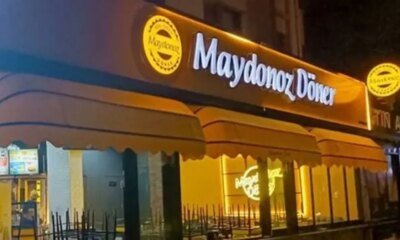
 Daily Agenda3 days ago
Daily Agenda3 days ago32 arrests in parsley doner operation connected to FETÖ
-
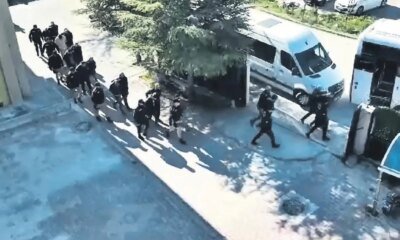
 Daily Agenda2 days ago
Daily Agenda2 days agoCrypos were deciphering – Breaking News
-
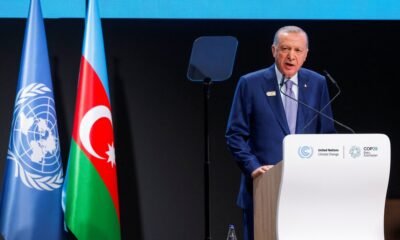
 Politics3 days ago
Politics3 days agoTürkiye, Australia battle to host 2026 UN climate talks
-
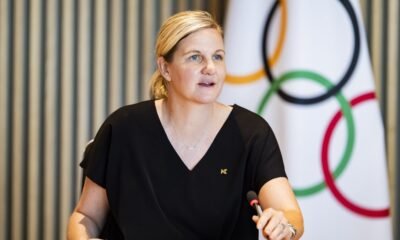
 Sports3 days ago
Sports3 days agoIOC Chair Coventry draws line on gender fairness amid controversy
-

 Sports1 day ago
Sports1 day agoChelsea set up Palmeiras clash after Club World Cup weather delay
-
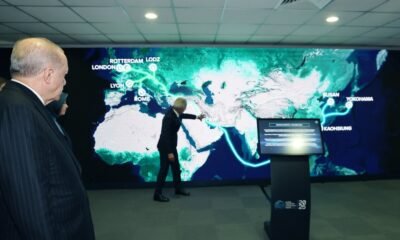
 Politics1 day ago
Politics1 day ago‘Türkiye set to be geostrategic hub of stability’
-

 Daily Agenda2 days ago
Daily Agenda2 days agoMinister Ali Yerlikaya explained! Operation for Cyber Crimes in 48 provinces: 284 suspects were caught in 1 week
-
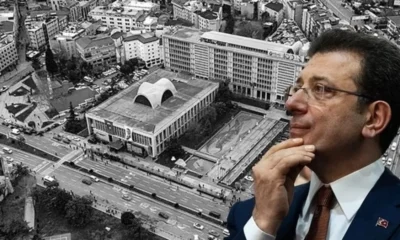
 Daily Agenda2 days ago
Daily Agenda2 days ago36 confessors in corruption investigation! Imamoglu’s key men told one by one: the bench broke down like this




